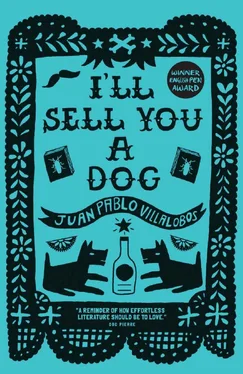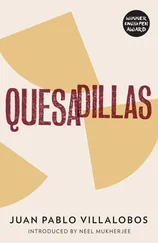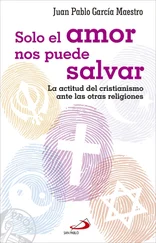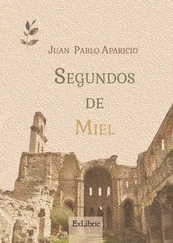It had happened one Wednesday afternoon, while I was drinking a beer and doggedly pressing a little button on the TV remote after I’d come across the shock of mad-scientist hair and mischievous face of Sergei Eisenstein. That’s when someone knocked at the door. They knocked, I mean, at my door, not the main door to the building, and that could only mean one thing. Actually, one of many things, which in the end came down to the same thing: Avon ladies, hungry children, drug addicts asking for change, phone company salespeople, talking mutes, seeing blind people, door-to-door kidnappers and shameless scroungers who hadn’t even bothered to come up with a story to inspire pity. The only ones who had disappeared, as a symbol of humanity’s progress, were the encyclopaedia salesmen. Knowing this perfectly well, I had no plans to open the door, so I ignored the knocking and carried on watching my programme. The knocking didn’t stop and I didn’t stop ignoring the knocking, either. The ads came on and the pounding on the door continued. Whoever it was was displaying the determination of a zealot.
I opened the door and saw a tall blond young man, transparent as a grub. He was wearing a short-sleeved white shirt, a pair of black trousers and had a little badge at the height of his heart with his name on it, a name that sounded like a Dutch painter of still lifes: Willem Heda. Very appropriate: as the hall light wasn’t working, he loomed up out of the chiaroscuro. Judging by his appearance I guessed he couldn’t be more than twenty, and was carrying out the mission of having doors slammed in his face in a poor country before going to university. In the unlikely event, that was, that going to university wasn’t a sin.
‘I bring yuh the word of the Lard,’ he said.
‘Great,’ I replied. ‘How much per ounce?’
He raised his blond eyebrows in surprise and they almost reached his hair. Then he looked down at the Bible in his right hand. I reached out my left one and rescued the Aesthetic Theory from the shelf by the door, where I kept it like a shotgun, just in case. He looked at the tome pulsating in my hand and his eyebrows reached the back of his neck.
‘Are yuh a perfessor?’
‘As if.’
‘I ask becuhse of the book.’
We both looked down at my left hand. He looked at the book as though it were a dog that needed a lead, as though it were a sin to have a book loose in the house.
‘This? It’s from the library, but don’t worry, it doesn’t bite.’
‘I bring yuh the word of the Lard,’ he said again. ‘D’yuh have five minutes t’spare?’
I could hear that the ads had finished and my programme was starting again. I held up the Aesthetic Theory , opened it at random and began to read: ‘To survive reality at its most extreme and grim, artworks that do not want to sell themselves as consolation must equate themselves with that reality.’
He held up his Bible, opened it at random and began to read: ‘I have seen all the warks that are done under the sun; and, behold, all is vanity’n vexation of sperit. Ecclesiastes 1:14.’
I started reading again: ‘Advanced art writes the comedy of the tragic: Here the sublime and play converge… Important artworks nevertheless seek to incorporate this art-alien layer. When, suspected of being infantile, it is absent from art, when the last trace of the vagrant fiddler disappears from the spiritual chamber musician and the illusionless drama has lost the magic of the stage, art has capitulated.’
And he read: ‘An’ I gave my heart t’know wisdom, and t’know madness and fawlly: I purceived that this also is vexation of sperit. Far in much wisdom is much grief: and he that increaseth knowledge increaseth sarrow.’
I looked from one book to the other: his was bigger. On the TV the programme was still on and I was missing it. I backed up so he could come in.
‘Come in, quickly. What’ll you have to drink, Villem?’
‘It’s pernounced “ Will -em”.’
‘Thanks for correcting me! A beer, Villem?’
‘A glass of wahder. Beer is a sin.’
‘No shit! Sit down, there’s a really good programme on.’
‘What’s it about?’
‘Scheming and affairs and how to get money for old rope.’
He took off the rucksack he had on his back and sat down on a folding chair, an aluminium one with the Corona beer logo on it. Thief robbing a thief. I sat down on the little armchair I had in front of the TV.
‘What’s yoah name?’ he asked.
‘Teo.’
‘Mateo?’
‘As if.’
‘Jus’ Teo?’
‘Teodoro.’
‘Like the awthor of the book?’
‘No, the guy who wrote the book’s called Theodor.’
‘It’s the same.’
‘It’s not the same. He’s got an extra “h” and he’s missing an “o”.’
‘Do yuh live alone?’
‘Could you let me watch my programme?’
He resigned himself to staring at the screen, where they were showing, one after another, black-and-white photographs taken in the Casa Azul.
‘Who’s the lady with the moustache?’ Willem asked.
‘What do you mean? That’s Frida Kahlo, the painter. Don’t tell me you don’t know who she is, even the Indians in the Amazon rainforest know who she is. She’s so famous they put up a statue of her in a park in a village of a hundred inhabitants in Uzbekistan, and Bulgaria and Denmark invented their own International Day of Frida Kahlo. See the guy with his trousers pulled up to his armpits? That’s Diego Rivera, the man of the house.’
‘I’d like to talk t’yuh about the word of the Lard. The word of the Lard is a great comfart for older people.’
I shot him a deadly look.
‘Pay attention.’
On the TV they were saying: she wanted to improvise her own freedom, in order elegantly to overcome a life of pain.
‘They really like suffering, Villem; what does elegance have to do with pain?’
‘Pain leads to the Lard.’
‘And elegance to hell. By the way, you look pretty elegant, that’s a neat little outfit you’ve got on.’
He flushed: the pigmentation of embarrassment transformed him from a larva into a shrimp, or from a raw shrimp into a cooked shrimp.
‘Don’t worry,’ I said soothingly, ‘it was a joke.’
On the screen they were showing images of Frida and Diego, Eisenstein, Dolores del Río, Arcady Boytler, Miguel Covarrubias, María Izquierdo, Xavier Villaurrutia, Adolfo Best Maugard, Lola and Manuel Álvarez Bravo, Trotsky, Juan O’Gorman and Pita Amor. Willem looked at the television and then stopped looking, inspecting my apartment in search of something that would let him start a conversation, and he thought he’d found it when he saw the painting hanging on the opposite wall.
‘Is that a clown?’ he asked.
‘It’s a portrait of my mother,’ I replied.
‘I’m sarry,’ he said, flushing again.
‘What are you sorry for — for having said my mother is a clown or for not having the sensitivity to appreciate art?’
He thought for a minute, confused.
‘Would yuh rather I came back another day?’
‘Don’t you want to watch the programme?’
‘I wanted to talk about the word of the Lard.’
‘Come back another day, then. If you’re lucky I might even open the door!’
It occurred to him to start coming twice a week, on Wednesdays and Saturdays, and it occurred to me to let him in, just to pass the time. When he found me in a listless mood or when I’d simply run out of beer, he would start preaching at me.
‘Yuh still have time to repent.’
‘Are you telling me I’m going to die?’ I answered.
‘It’s never too late to repent.’
‘What — for having let you in that first day? I wish!’
Читать дальше












